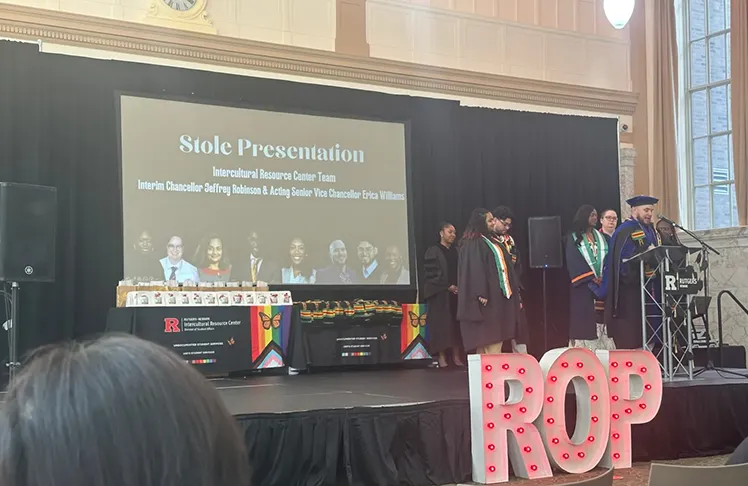
by Aaliyah Amos
In 1992, Junaita Jones Daly was a senior engineering student at Rutgers University’s New Brunswick campus when Francis Lawrence, then the university’s president, seemingly linked low test scores of Black students to their “genetic, hereditary background.”
Like other Black students angry about Lawrence’s gaffe, Daly believed it undermined her presence and accomplishments at Rutgers-New Brunswick, ignoring the challenges of life on a mostly-white campus. A few months later, she had an idea of what to do about it: a special ceremony honoring Black and brown Rutgers graduates.
Daly didn’t know it then, but she was about to launch what would become the Rutgers Rites of Passage, a ceremony that has become an important tradition for students of color at the New Jersey university’s campuses in Newark, New Brunswick, and Camden. For more than three decades, the Rites of Passage has combined well-known rituals of academic achievement with music and ceremonies from different cultures that celebrate important life transitions.
Preserve, Uplift, Secure
The idea “was about celebrating Black and Latino students who are graduating from Rutgers,” Daly recalled in a recent interview. “It was never meant to be exclusive. It was meant to be an intentional celebration of individuals who probably have a harder time matriculating through.”
At every ceremony, students recite a charge written by Daly herself, urging them to preserve the past, uplift the present, and secure the future by using the talents they developed in college and to stay as a community with one another.
Rutgers Newark has celebrated the ceremony since 2019. Initially organized by a student-run committee, it was later taken up by the Intercultural Resource Center following the pandemic.
“It was about celebrating Black and Latino students who are graduating from Rutgers. It was meant to be an intentional celebration of individuals who probably have a harder time matriculating through.”
Junaita Jones Daly, Rutgers-New Brunswick alumna
In 1992, the year Daly started the program, Black enrollment at Rutgers and other public research universities was just over 11.2%, with Hispanic enrollment at 8.5%. But Lawrence’s remark triggered student protests and spurred activists to demand change.
“The numbers told the story, but all they did was (tell) the story of the challenges” of life as just 11 percent of the student body, Daly says. “But where were we celebrating the successes?”
Lightbulb Moment
At a National Society of Black Engineers conference that year, Daly says, she saw another university honor its graduates of color. She says she realized this was exactly what Rutgers needed: after returning to the Brunswick campus, she immediately began organizing what was then known as the Black and Latino Commencement Celebration.
Around 100 people came to the first ceremony, which Daly considered a success. Although she says she did not have much involvement in the following years, her co-creator, Jefferey Robinson — then a junior at Rutgers-New Brunswick — continued the program.
Now, 33 years later, the ceremony is referred to as the Rites of Passage ceremony and is celebrated across all three Rutgers campuses.
At this year’s ceremony May 17, the graduating students entered Ruth Bader Ginsburg Hall to the rhythm of live Afro-Latin music before taking their seats for the program. The audience included family, friends, and Rutgers faculty, gathered to bear witness and celebrate the students’ achievements.
The Rutgers African-American Alumni Alliance (RAAA) also sponsors the event and awards scholarships to one student on each campus. This year’s Newark campus recipient was Rewan Ahmed, a biology major with double minors in chemistry and health and society.
An Egyptian student, Ahmed, found the ceremony both beautiful and inclusive.
“Excited to Experience This Tradition”
Anya Dillard, a senior at Rutgers-Newark, delivered the keynote speech.
“It was honestly a good reflection of Rutgers-Newark as a whole because that’s how it felt all my four years,” she said. “Rites of Passage truly was a nice send off to really show how diverse it was in the communities we have, especially within Newark and even out of Newark.”
Dillard, who is Afro-Guyanese, said she was proud of being selected to deliver the Rites of Passage commencement address — and participating in a joyful ceremony that acknowledges and honors her place at Rutgers.
“The Rutgers alumni who have come out of these organizations all had fond memories of their own Rites of Passage ceremonies,” she told Word In Black. “Hearing each of their testimonies over the years made me excited to experience this tradition for myself.”
She says her speech focused on how the collective community made a difference on campus, and can help change the world.
“We did not arrive here, at this moment, by accident. We dared to imagine a world freer than the one we inherited,” Dillard recalled telling the audience. “We pulled each other up, broke cycles, organized, and mobilized. So to all of my fellow graduates: the world needs your courage, your fight, your fire — now, more than ever.”



